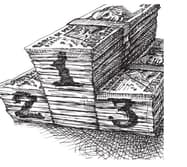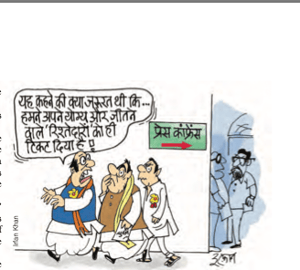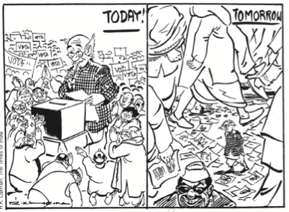What Makes Elections in India Democratic?
What Makes Elections in India Democratic?: Overview
Through the topic, we will discuss various aspects that make elections democratic in India. It lists the powers of the Election Commission of India. It further explains the importance of people’s participation.
Important Questions on What Makes Elections in India Democratic?
Why does the Election Commission have so much power? Is this good for democracy?
Titled ‘Electoral Campaigns’, this cartoon was drawn in the Latin American context. Does this apply to India and to other democracies in the world?

The leader coming out of a press conference said: “What was the need to say that we have distributed tickets only amongst suitable and winnable family relations?”
Do you think that family politics is confined to only a few states or parties?

Is this an accurate picture of what happens to the voter before and after elections? Must this always happen in a democracy? Can you think of examples when this did not happen?

Here are some facts about the Indian elections. Comment on each of these to say whether they reflect the strength or the weakness of our electoral system:
(a) The 16th Lok Sabha has percent women members.
(b) The Election Commission often refuses to accept the government’s advice about when the election should be held.
(c) The th Lok Sabha has more than members whose assets are more than Rs. crore.
(d) After losing an election, the Chief Minister said: “I respect the people’s verdict”.
Ramesh was not in class when Electoral Politics was being taught. He came the next day and repeated what he had heard from his father. Can you tell Ramesh what is wrong with these statements?
a. Women always vote the way men tell them to. So what is the point of giving them the right to vote?
b. Party politics creates tension in society. Elections should be decided by consensus, not by competition.
c. Only graduates should be allowed to stand as candidates for elections.
Here are some reports of malpractices in Indian elections. Identify what the problem in each case is. What should be done to correct the situation?
a. Following the announcement of elections, the minister promised to provide financial aid to reopen the closed sugar mill.
b. Opposition parties alleged that their statements and campaign was not given due attention in Doordarshan and All India Radio.
c. An inquiry by the Election Commission showed that electoral rolls of a state contain name of 20 lakh fake voters
d. The hoodlums of a political party were moving with guns, physically preventing supporters of other political parties to meet the voters and attacking meetings of other parties.Read these headlines carefully and identify which powers are used by the Election Commission in each instance to ensure free and fair elections.
EC issues notification constituting th Lok Sabha
EC Shoots down HM advice on poll reforms
Photo I-Cards not mandatory in Bihar Polls
EC accepts new Haryana DGP
EC will seek power to censure political ads
EC says no immediate plan to ban exit polls
EC orders repoll in more booths
EC to keep closer eye on hidden poll costs
EC tightens norms for poll expenses
EC to visit Gujarat again, review poll arrangements
HC asks EC to bar "Criminal Netas"
Can we draw the following conclusion from the information given in this chapter? Give two facts to support your position for the given statement.
- Many reforms are needed to make our elections completely free and fair.
Can we draw the following conclusions from the information given in this chapter? Give two facts to support your position for the given statement.
The Election Commission of India does not have enough powers to conduct free and fair elections in the country.
List all the different election-related activities mentioned in the chapter and arrange them in a time sequence, beginning with the first activity and ending with the last. Some of these activities are given below:
Releasing election manifestos; counting of votes; making of voters' list; election campaign; declaration of election results; casting of votes; ordering of re-poll; announcing election schedule; filing nomination.
Which of these is not a good reason to say that Indian elections are democratic?
